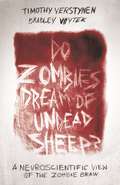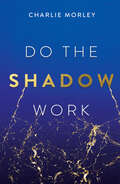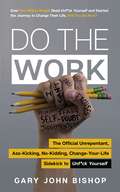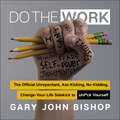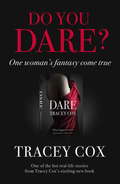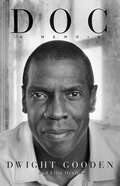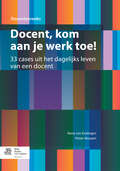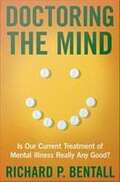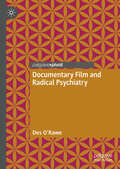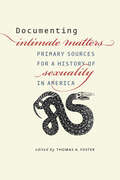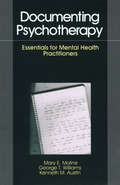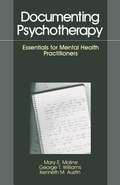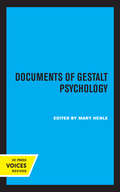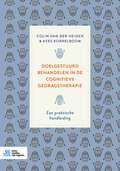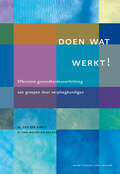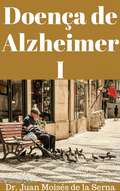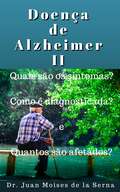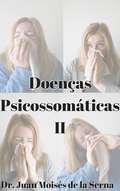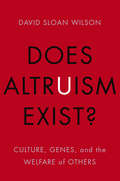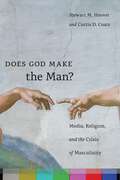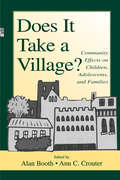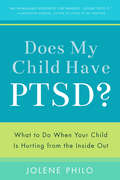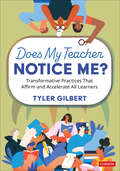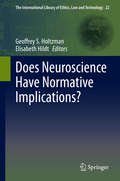- Table View
- List View
Do Zombies Dream of Undead Sheep?: A Neuroscientific View of the Zombie Brain
by Timothy Verstynen Bradley VoytekA look at the true nature of the zombie brainEven if you've never seen a zombie movie or television show, you could identify an undead ghoul if you saw one. With their endless wandering, lumbering gait, insatiable hunger, antisocial behavior, and apparently memory-less existence, zombies are the walking nightmares of our deepest fears. What do these characteristic behaviors reveal about the inner workings of the zombie mind? Could we diagnose zombism as a neurological condition by studying their behavior? In Do Zombies Dream of Undead Sheep?, neuroscientists and zombie enthusiasts Timothy Verstynen and Bradley Voytek apply their neuro-know-how to dissect the puzzle of what has happened to the zombie brain to make the undead act differently than their human prey.Combining tongue-in-cheek analysis with modern neuroscientific principles, Verstynen and Voytek show how zombism can be understood in terms of current knowledge regarding how the brain works. In each chapter, the authors draw on zombie popular culture and identify a characteristic zombie behavior that can be explained using neuroanatomy, neurophysiology, and brain-behavior relationships. Through this exploration they shed light on fundamental neuroscientific questions such as: How does the brain function during sleeping and waking? What neural systems control movement? What is the nature of sensory perception?Walking an ingenious line between seriousness and satire, Do Zombies Dream of Undead Sheep? leverages the popularity of zombie culture in order to give readers a solid foundation in neuroscience.
Do the Shadow Work: And Find Lasting Self-Love and Acceptance
by Charlie MorleyDiscover what shadow work really is and how to reclaim and integrate your shadow self for healing and transformation.Your shadow is made up of everything you hide from the world: your fears, your shame and your wounds, but also your untapped brilliance, unexpressed talents and potential. By learning to embrace and integrate these hidden aspects of yourself, you can unlock profound healing, self-awareness and personal power.With over 20 practices that blend ancient wisdom and modern psychology, this transformative guide will help you:Recognize the shadow and how you create and project itFind and express the golden or &‘positive&’ shadow selfTransform fear and shame into loving awareness, energy and powerIntegrate the parental, sexual, ancestral and childhood shadows.This book will take you on a life-changing and healing journey of self-acceptance. It&’s time to stop running from your shadow and start befriending it. It&’s time to do the shadow work.Part of this book was previously published as Dreaming Through Darkness (ISBN: 9781781807354).
Do the Work: The Official Unrepentant, Ass-Kicking, No-Kidding, Change-Your-Life Sidekick to Unf*ck Yourself (Unf*ck Yourself)
by Gary John BishopIf only you had more money, a different job, a bigger house, a passionate romance . . . your day-to-day would be a whole lot better, right? Blah de blah, blah, blah. Let Gary John Bishop dispel the bullsh*t you tell yourself and instead motivate you to design the life you want. This practical workbook expands the lessons in the international bestseller Unf*ck Yourself. It is a personal workshop for your brain, where you can determine what matters to you, empowering you to move forward without the emotional baggage. Broken down into three key pillars - self, people and purpose - you will answer Bishop's curated list of life-altering questions. These questions reveal what you have suppressed or tried to minimize, the kinds of thing one might throw into their metaphorical backpack and carry around until the weight becomes too much. By doing the work, you will understand your feelings and your actions like you never have before. The exercises allow you to stop the negative chatter, improve your relationships and give you the courage to instigate positive change. Do the Work is the nudge (or more like the kick in the ass) you need to get out of your rut.
Do the Work: The Official Unrepentant, Ass-Kicking, No-Kidding, Change-Your-Life Sidekick to Unf*ck Yourself (Unf*ck Yourself)
by Gary John BishopIf only you had more money, a different job, a bigger house, a passionate romance . . . your day-to-day would be a whole lot better, right? Blah de blah, blah, blah. Let Gary John Bishop dispel the bullsh*t you tell yourself and instead motivate you to design the life you want. This practical workbook expands the lessons in the international bestseller Unf*ck Yourself. It is a personal workshop for your brain, where you can determine what matters to you, empowering you to move forward without the emotional baggage. Broken down into three key pillars - self, people and purpose - you will answer Bishop's curated list of life-altering questions. These questions reveal what you have suppressed or tried to minimize, the kinds of thing one might throw into their metaphorical backpack and carry around until the weight becomes too much. By doing the work, you will understand your feelings and your actions like you never have before. The exercises allow you to stop the negative chatter, improve your relationships and give you the courage to instigate positive change. Do the Work is the nudge (or more like the kick in the ass) you need to get out of your rut.(P) 2019 HarperAudio
Do you Dare?
by Tracey CoxMichelle has always wondered what it would be like to sleep with another woman, but has been too shy to suggest it to her boyfriends. But when Michelle's new man starts talking dirty to her, she can't resist suggesting they turn their fantasy into reality. But how will her dreams of a threesome translate when played out in stark reality?This special free ebook, by international sex expert Tracey Cox, is just one example of what women dream about - and what happens when they dare to take what existed perfectly in their heads into the reality of their beds. Michelle's fantasy is written in three parts:The fantasy - what she imagined the encounter would beThe decision - the switch to reality to find out why she decided to act out her fantasyThe reality - what actually happened in real life
Doc: A Memoir
by Jeff Johnson Ellis Henican Dwight GoodenA bruisingly honest memoir of addiction and recovery from one of the greatest pitchers of all time. With fresh and sober eyes, Dwight Gooden shares the most intimate moments of his successes and failures, from endless self-destructive drug binges to three World Series rings. Known for his triumphs on the baseball field and his excesses off of it, Gooden was a soft-spoken, dominating wunderkind who tallied a mountain of strikeouts while leading the 1986 bad-boy New York Mets to a World Series win. Even at that pinnacle, Gooden had already succumbed to a cocaine addiction that would short-circuit his career and personal life. Gooden's story transcends baseball, from his childhood in Tampa raised by a father who was an alcoholic womanizer, to the recent experience of overcoming his own demons on the show Celebrity Rehab. Along the way, Gooden offers a unique perspective on Yankees owner and stalwart supporter George Steinbrenner and some of the greatest baseball players of all time. Doc is the definitive look at a life equal parts inspiring and heartbreaking.
Docent, kom aan je werk toe!: 33 cases uit het dagelijks leven van een docent
by Pieter Mostert René Van KralingenDit boek 'daar zit je dan als docent' richt zich op docenten in het mbo, hbo en wo en helpt docenten bij hun rol als examencommissielid, toetscommissielid, coordinator jaar 1, studieloopbaanbegeleider, toetsontwikkelaar.....rollen die lastig zijn omdat de Onderwijsinspectie meekijkt, de NVAO om rapportages vraagt, het management vanuit cijfers werkt. Kortom een boek wat veel docenten in het beroepsonderwijs zullen pakken omdat de casuïstiek tot herkenning leidt en de oplossingen praktisch en hands-on zijn. Het boek heeft iets van het boek 'eerste hulp bij didactische ongelukken', maar richt zich veel meer op lastige management- en schoolorganisatievraagstukken van docenten, uitgewerkt in enkele tientallen casussen.
Doctoring the Mind
by Richard BentallToward the end of the twentieth century, the solution to mental illness seemed to be found. It lay in biological solutions, focusing on mental illness as a problem of the brain, to be managed or improved through drugs. We entered the "Prozac Age" and believed we had moved far beyond the time of frontal lobotomies to an age of good and successful mental healthcare. Biological psychiatry had triumphed.Except maybe it hadn't. Starting with surprising evidence from the World Health Organization that suggests that people recover better from mental illness in a developing country than in the first world, Doctoring the Mind asks the question: how good are our mental healthcare services, really? Richard P. Bentall picks apart the science that underlies our current psychiatric practice. He puts the patient back at the heart of treatment for mental illness, making the case that a good relationship between patients and their doctors is the most important indicator of whether someone will recover.Arguing passionately for a future of mental health treatment that focuses as much on patients as individuals as on the brain itself, this is a book set to redefine our understanding of the treatment of madness in the twenty-first century.
Documentary Film and Radical Psychiatry
by Des O'RaweThis book examines how documentary film responded to the methods and controversies associated with radical psychiatry, especially during the long 1960s. Broad in scope and comparative in approach, it discusses a range of films in terms of how their production histories and visual styles were influenced by wider cultural, technological, and autobiographical factors. The book argues that documentary filmmaking offers both an important critical perspective on psychiatric treatments, institutions, and attitudes, as well as contributing to a critique of how normative modes of being are constructed across mainstream media and popular culture. In their negotiations with the politics of psychiatry, such films will often question the ethnographic and observational integrity of the documentary or “non-fiction” form itself, especially when it adopts diaristic, interactive, socially engaged and advocatory strategies to represent mental illness and healthcare provision. The relationship between documentary film and the constellation of insights, arguments, communities, and individuals associated with the moment of radical psychiatry remains a complex but indispensable legacy of the post-war era.
Documenting Intimate Matters: Primary Sources for a History of Sexuality in America
by Thomas A. Foster“Thorough, and timely . . . sure to be a popular and valued companion to courses on the history of sexuality and gender in the United States.” —Regina Kunzel, University of MinnesotaOver time, sexuality in America has changed dramatically. Frequently redefined and often subject to different systems of regulation, it has been used as a means of control; it has been a way to understand ourselves and others; and it has been at the center of fierce political storms, including some of the most crucial changes in civil rights in recent years. Edited by Thomas A. Foster, Documenting Intimate Matters features seventy-two documents that collectively highlight the broad diversity inherent in the history of American sexuality.Complementing the third edition of Intimate Matters, by John D’Emilio and Estelle B. Freedman—often hailed as the definitive survey of sexual history in America—the multiple narratives presented by these documents reveal the complexity of this subject in US history. The historical moments captured in this volume show that, contrary to popular misconception, the history of sexuality is not a simple story of increased freedoms and sexual liberation, but an ongoing struggle between change and continuity.
Documenting Psychotherapy: Essentials for Mental Health Practitioners
by Dr Mary E. Moline Dr George T. Williams Dr Kenneth M. AustinThis concise volume examines exactly what is involved in keeping adequate clinical records of individual, family, couple and group psychotherapy. The authors discuss: limits of confidentiality; retention and disposing of records; documentation of safety issues; client access to records; treatment of minors; and training and supervision issues. Throughout the book, legal cases, vignettes and professional commentary help readers to consider legal and ethical issues.
Documenting Psychotherapy: Essentials for Mental Health Practitioners
by Mary E. Moline George T. Williams Kenneth M. AustinAvoid malpractice for keeping inadequate records and be prepared to respond to a professional peer review by using Documenting Psychotherapy a practical volume that examines what is necessary to keep adequate records that meet current standards of care. This highly readable volume explores issues such as confidentiality, retention and disposition of records, documentation of safety issues, client access to records, treatment of minors, and the clinical record as it pertains to working with families, couples, individuals, and groups. Supervision and training issues are discussed in detail. Legal cases, vignettes, and professional commentary are used throughout the book to help guide the reader in thinking through legal and ethical situations
Documents of Gestalt Psychology
by Mary HenleThis title is part of UC Press's Voices Revived program, which commemorates University of California Press’s mission to seek out and cultivate the brightest minds and give them voice, reach, and impact. Drawing on a backlist dating to 1893, Voices Revived makes high-quality, peer-reviewed scholarship accessible once again using print-on-demand technology. This title was originally published in 1961.
Doelgestuurd behandelen in de cognitieve gedragstherapie: Een praktische handleiding
by Kees Korrelboom Colin van der HeidenDit boek helpt behandelaren in de ggz om doelgestuurd te behandelen en daarmee behandelingen efficiënter te maken. Het beschrijft de achtergrond én de uitvoering in de klinische praktijk. Doelgestuurd behandelen in de cognitieve gedragstherapie laat zien hoe belangrijk het is om aan het begin van de behandeling concrete en haalbare doelen te stellen en daarop te sturen. Dat wil zeggen dat behandelingen worden afgerond zodra de doelen behaald zijn, maar ook als duidelijk wordt dat deze niet haalbaar zijn. Het toepassen van doelgestuurde principes is vooral een attitudeverandering, allereerst bij de behandelaar maar ook bij de patiënt. Na een inleidend hoofdstuk waarin de achtergronden en contouren van doelgestuurd behandelen uit de doeken worden gedaan, wordt in de daarop volgende vier hoofdstukken geschetst hoe elk van de doelgestuurde principes in de praktijk kan worden toegepast. Het boek biedt concrete handvatten om aan de slag te gaan, aan de hand van onderwerpen als verwachtingenmanagement, doelen formuleren, taakverdeling, meten en evalueren en sturen op uitkomsten. De werkwijze wordt geïllustreerd aan de hand van casusbeschrijvingen en gespreksfragmenten. Auteurs zijn Colin van der Heiden en Kees Korrelboom. Colin van der Heiden is klinisch psycholoog en psychotherapeut en supervisor van de VGCt. Hij werkt op zzp-basis voor diverse zorginstellingen en is als onderzoeker in dienst van de Parnassia Groep. Kees Korrelboom is klinisch psycholoog en psychotherapeut en emeritus bijzonder hoogleraar bij het departement Medische en Klinische Psychologie van Tilburg University.
Doen wat werkt !
by M. van der Burgt E. van Mechelen-GeversGezondheidsvoorlichting en –bevordering (GVO) en preventie vormen samen een specifieke verpleegkundige competentie. In deze praktische handleiding komen alle aspecten van (groeps)voorlichting aan bod. Het boek gaat uit van de huidige praktijk van gezondheidsvoorlichting door verpleegkundigen. Door de vele voorbeelden in dit boek kan elke verpleegkundige situaties en problemen uit de eigen beroepspraktijk herkennen. Er is gekozen voor een praktische benadering. Zo behandelt het boek de actiepunten voor het verzorgen van een voorlichtingsbijeenkomst en het ontwikkelen van een lokaal gezondheidsproject. Door de methodische benadering en het presenteren van evidence en good practice levert het boek een bijdrage aan de verdere professionalisering van de verpleegkundige op het gebied van gezondheidsvoorlichting. Voorbeelden en interviews maken de theorie van gezondheidsvoorlichting inzichtelijk en praktisch bruikbaar. Programmavoorbeelden, evaluatieformulieren en checklists zijn opgenomen als hulpmiddelen voor de verpleegkundige praktijk. Met dit boek kan de verpleegkundige direct aan de slag.
Doença de Alzheimer I
by Carlos Oliveira Juan Moises de la SernaO alzheimer é uma doença que tem crescido em relação ao número de casos de afetados nos últimos anos, o que por sua vez provoca o surgimento de muitas perguntas quando uma pessoa ou um familiar recebe esse diagnóstico, tal como: o que é o Alzheimer? Qual a sua origem? Existe tratamento? Como evolui a doença? Quais consequências acarreta na vida cotidiana? Quais são os efeitos psicológicos sobre o paciente? É possível superar? É transmissível para os filhos? Se abre diante de nós todo um leque de questões relativas à incerteza que é saber que padecemos com uma doença cada vez mais "comum" e estendida, e que apenas se sabe sobre os últimos avanços científicos nesta área, devido, em boa medida, à complexidade da linguagem técnica empregada. E também porque estes avanços tendem a chegar somente aos especialistas através de reuniões e congressos onde se compartilha esse tipo de informação.
Doença de Alzheimer II: Quais são os sintomas?, Como é diagnosticada? e Quantos são afetados?
by Cleiton Cândido da Silva Juan Moises de la SernaO objetivo do e-book é servir como uma primeira aproximação para aqueles que têm em si mesmos ou em sua família, a Doença de Alzheimer. Este livro tenta apresentar claramente os resultados das mais recentes pesquisas sobre a doença de Alzheimer, que respondem as perguntas mais importantes, o que provoca sintomas? Como é diagnosticado? Quantos afetados existem?
Doenças Psicossomáticas
by Juan Moises de la Serna Beatriz Sosa RebeloAs patologias psicossomáticas conduzem muitos pacientes de consulta em consulta sem encontrar um diagnóstico claro sobre o que têm e, acima de tudo, sem receber um tratamento adequado, descubra como identificá-las e saber qual o melhor tratamento para cada caso. São muitos os problemas associados aos transtornos psicossomáticos, os quais são de difícil diagnóstico e requerem uma intervenção global para o seu tratamento. Neste texto são descritos estes transtornos, como afetam a saúde, suas causas e intervenções para a sua cura.
Does Altruism Exist?
by David Sloan WilsonDavid Sloan Wilson, one of the world’s leading evolutionists, addresses a question that has puzzled philosophers, psychologists, and evolutionary biologists for centuries: Does altruism exist naturally among the Earth’s creatures? The key to understanding the existence of altruism, Wilson argues, is by understanding the role it plays in the social organization of groups. Groups that function like organisms indubitably exist, and organisms evolved from groups. Evolutionists largely agree on how functionally organized groups evolve, ending decades of controversy, but the resolution casts altruism in a new light: altruism exists but shouldn’t necessarily occupy center stage in our understanding of social behavior. After laying a general theoretical foundation, Wilson surveys altruism and group-level functional organization in our own species—in religion, in economics, and in the rest of everyday life. He shows that altruism is not categorically good and can have pathological consequences. Finally, he shows how a social theory that goes beyond altruism by focusing on group function can help to improve the human condition in a practical sense. Does Altruism Exist? puts old controversies to rest and will become the center of debate for decades to come.
Does God Make the Man?: Media, Religion, and the Crisis of Masculinity
by Stewart M. Hoover Curtis D. CoatsMany believe that religion plays a positive role in men’s identity development, with religion promoting good behavior, and morality. In contrast, we often assume that the media is a negative influence for men, teaching them to be rough and violent, and to ignore their emotions. In Does God Make the Man?, Stewart M. Hoover and Curtis D. Coats draw on extensive interviews and participant observation with both Evangelical and non-Evangelical men, including Catholics as well as Protestants, to argue that neither of these assumptions is correct.Dismissing the easy notion that media encourages toxic masculinity and religion is always a positive influence, Hoover and Coats argue that not only are the linkages between religion, media, and masculinity not as strong and substantive as has been assumed, but the ways in which these relations actually play out may contradict received views. Over the course of this fascinating book they examine crises, contradictions, and contestations: crises about the meaning of masculinity and about the lack of direction men experience from their faith communities; contradictions between men’s religious lives and media lives, and contestations among men’s ideas about what it means to be a man. The book counters common discussions about a “crisis of masculinity,” showing that actual men do not see the world the way the “crisis talk” has portrayed it—and interestingly, even Evangelical men often do not see religion as part of the solution.
Does It Take A Village?: Community Effects on Children, Adolescents, and Families (Penn State University Family Issues Symposia Series)
by Alan Booth Ann C. CrouterDoes It Take a Village? focuses on the mechanisms that link community characteristics to the functioning of the families and individuals within them--community norms, economic opportunities, reference groups for assessing relative deprivation, and social support networks. Contributors underscore those features of communities that represent risk factors for children, adolescents, and their families, as well as those characteristics that underlie resilience and thus undergird individual and family functioning. As a society we have heavy investments both in research and in programs based on the idea that communities affect families and children, yet important questions have arisen about the validity of the link between communities, children, and families. This book answers the question of whether--and how--it takes a village to raise a child and what we can do to help communities achieve this essential task more effectively.
Does My Child Have Ptsd?: What to Do When Your Child Is Hurting from the Inside Out
by Jolene PhiloA mother, advocate, and educator shares research and personal experience in this guide to help anyone care for children dealing with PTSD.Is it possible that the struggles you have with your child may be because he or she suffers from post-traumatic stress disorder (PTSD)? Once ignored, even by the medical professionals treating war veterans, PTSD is gaining global recognition as a very real and serious issue for those who have experienced traumatic events, even children. When children experience medical illness, witness violence, or are abused, it can leave a lasting effect. According to recent studies, 50 to 60 percent of children who experience these traumas early in life may suffer from a form of PTSD, leading to issues in childhood, through adolescence, and even into adulthood. Does My Child Have PTSD? is designed for readers looking for answers about the puzzling, disturbing behaviors of children in their care. With years of research and personal experience, Philo provides critical information to help people understand causes, symptoms, prevention, and effective diagnosis, treatment, and care for any child struggling with PTSD. “Philo’s dramatic story will capture the reader's attention, and there’s tremendous value in her patient explanations, from a simple definition of trauma to an exploration of PTSD causes, myths, and common terminology. . . . Though occasionally heart-wrenching, the book is organized so simply and logically as to be easy to follow and digest. Each chapter ends with “reflection questions” and additional valuable resources. Philo concludes on a hopeful note, providing encouragement and reassurance for other families in similar situations.” —Publishers Weekly, Starred Review
Does My Teacher Notice Me?: Transformative Practices That Affirm and Accelerate All Learners
by Tyler GilbertHow well do you notice your students? Affirming students’ thinking and adapting the learning experience to support and advance their understanding is an act of both expertise and compassion. This is teacher noticing. Does My Teacher Notice Me? emphasizes the often-overlooked skill of teacher noticing: observing or paying attention to students’ thinking and following up with appropriate actions to elevate or advance their learning experience or knowledge. By exploring the characteristics and components of expert teacher noticing, this hands-on resource provides guidance for educators seeking to elevate their teaching practice, enhance student engagement, and boost learning outcomes. Inside, you′ll discover How to observe and respond to student needs in the moment Strategies for fostering meaningful conversations with students Learning intentions, success criteria, prompts, templates, and reflection questions that bring the content to life Tips for cultivating compassion in the classroom Effectively noticing is a complex yet essential aspect of teaching expertise. Does My Teacher Notice Me? helps teachers puts students at the center of the learning process. Through this book, teachers will adopt a different way of being present with learners and discover new ways of having more meaningful conversations that lead to student success.
Does My Teacher Notice Me?: Transformative Practices That Affirm and Accelerate All Learners
by Tyler GilbertHow well do you notice your students? Affirming students’ thinking and adapting the learning experience to support and advance their understanding is an act of both expertise and compassion. This is teacher noticing. Does My Teacher Notice Me? emphasizes the often-overlooked skill of teacher noticing: observing or paying attention to students’ thinking and following up with appropriate actions to elevate or advance their learning experience or knowledge. By exploring the characteristics and components of expert teacher noticing, this hands-on resource provides guidance for educators seeking to elevate their teaching practice, enhance student engagement, and boost learning outcomes. Inside, you′ll discover How to observe and respond to student needs in the moment Strategies for fostering meaningful conversations with students Learning intentions, success criteria, prompts, templates, and reflection questions that bring the content to life Tips for cultivating compassion in the classroom Effectively noticing is a complex yet essential aspect of teaching expertise. Does My Teacher Notice Me? helps teachers puts students at the center of the learning process. Through this book, teachers will adopt a different way of being present with learners and discover new ways of having more meaningful conversations that lead to student success.
Does Neuroscience Have Normative Implications? (The International Library of Ethics, Law and Technology #22)
by Elisabeth Hildt Geoffrey S. HoltzmanThis book brings together a number of essays that are optimistic about the ways certain neuroscientific insights might advance philosophical ethics, and other essays that are more circumspect about the relevance of neuroscience to philosophical ethics. As a whole, the essays form a self-reflective body of work that simultaneously seeks to derive normative ethical implications from neuroscience, and to question whether and how that may be possible at all. In doing so, the collection brings together psychology, neuroscience, philosophy of mind, ethics, and philosophy of science. Neuroscience seeks to understand the biological systems that guide human behavior and cognition. Normative ethics, on the other hand, seeks to understand the system of abstract moral principles dictating how people ought to behave. By studying how the human brain makes moral judgments, can philosophers learn anything about the nature of morality itself? A growing number of researchers believe that neuroscience can, indeed, provide insights into the questions of philosophical ethics. However, even these advocates acknowledge that the path from neuroscientific is to normative ethical ought can be quite fraught.
